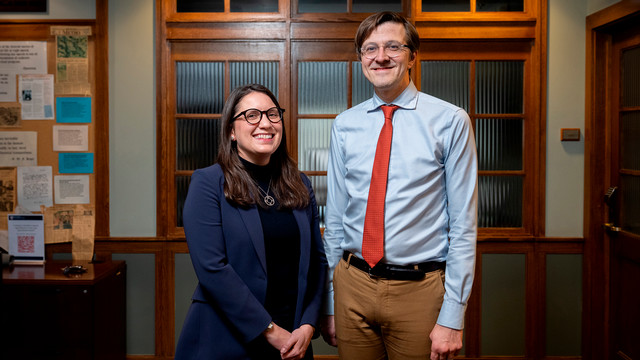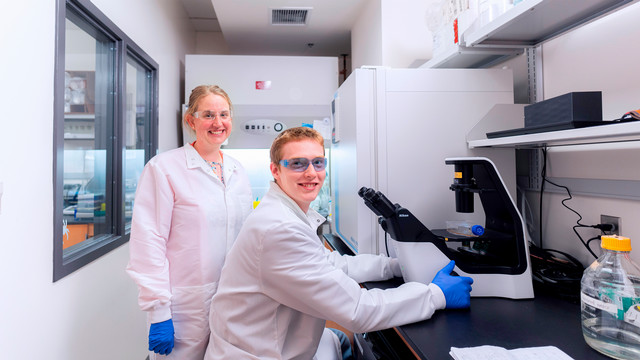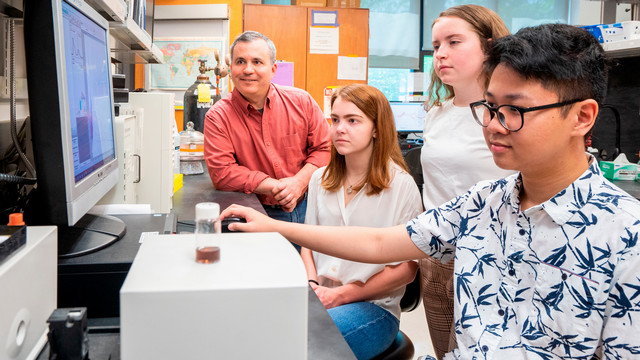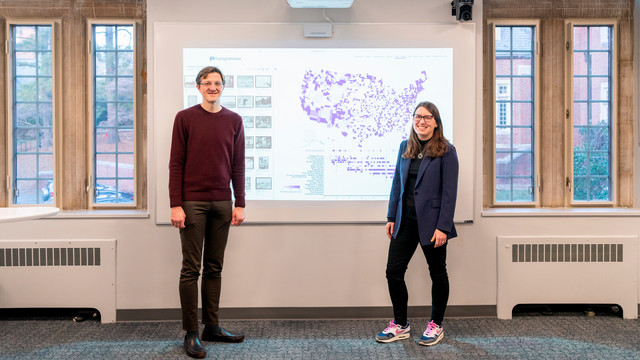
Fall 2024/Winter 2025
-
Michelle Kahn receives 2025-26 National Humanities Center Fellowship
Michelle Kahn, Associate Professor of History, has been awarded a $26,000 National Humanities Center Fellowship for 2025-26 to support writing her book tentatively titled Neo-Nazis in Germany and the United States: An Entangled History of Hate, 1945-2000. The National Humanities Center is the world’s only independent institute dedicated exclusively to advanced study in all areas of the humanities.
Kahn’s research taps into the public’s urgent fascination with far-right extremism given the ongoing surge in extremist groups and ideologies around the world. Her book will offer the first study of the transatlantic connections between German and American neo-Nazis, Holocaust deniers, and white supremacists from the end of World War II in 1945 through the rise of the Internet era in the 1990s.
-
John Peters receives over $500,000 in NSF funding for neuroscience research
John Peters, Assistant Professor of Biology, has received a $502,981 National Science Foundation award to support his research on the mechanisms of learning and memory. The overarching goal of the project is to characterize the mechanisms of membrane fusion in the delivery of AMPA receptors (AMPARs) to the plasma membrane during long-term potentiation, which plays a key role in memory formation. Peters will employ both computational methods and “wet lab” in vitro methods in his research. This work will lead to a better understanding of how synapses function and how the delivery of neurotransmitter receptors is regulated. The study will also identify novel protein-protein interactions responsible for AMPAR trafficking and lay the groundwork in Peters’ laboratory for exciting future research to characterize novel AMPAR regulators.
The NSF grant presents important opportunities for undergraduate biology researchers at Richmond as well. Students in Peters’ lab will engage in independent research experiences, gaining important skills in molecular biology and developing a sense of belonging within the scientific community. Peters’ students will also have several professional development opportunities essential to early career scientists, including traveling to national conferences to present their research and collecting data at national laboratories.
-
Olivier Delers and Mimi Hanaoka named ACS Mellon Academic Leadership Fellows
Olivier Delers, Professor of French, and Mimi Hanaoka, Associate Professor of Religion, have been named Associated Colleges of the South (ACS) Mellon Academic Leadership Fellows for 2025-27.
The fellowship is an embedded program for tenured humanities faculty who aspire to a position in higher education administrative leadership. Both Delers and Hanaoka will serve as Special Assistants to the Provost, each focusing on distinct yet complementary initiatives that integrate the humanities and career development while advancing the University’s commitment to a broadly welcoming environment for all students and faculty.
Olivier Delers is interested in building programs and cross-campus collaborations that integrate humanistic learning and career preparation. He will work with faculty to map practical pathways to growing humanities offerings at Richmond in ways that align with their current teaching and research. Mimi Hanaoka was driven to pursue the fellowship by a desire to foster inclusion and belonging for faculty and ensure they have the support, resources, and partnerships necessary to thrive as teachers and scholars.
-
Dr. Ashley Austin receives $15,000 to explore the use of AI in financial auditing
Ashley Austin, Associate Professor of Accounting in the Robins School of Business, has received $15,000 from PricewaterhouseCoopers (PwC) to explore the benefits and limitations of artificial intelligence (AI) in auditing services offered by public accounting firms. Austin and her partners at the University of Virginia and University of Georgia will explore strategies that may help auditors maintain sufficient skepticism when evaluating persuasive evidence provided by generative AI tools.
By synthesizing large datasets and identifying key insights, generative AI can be used within financial reporting to automate the creation of detailed and accurate financial statements, forecasts, and analyses. Generative AI tools are designed to exude confidence and always provide an answer. However, despite their high level of accuracy and persuasiveness, AI insights are, essentially, only very good guesses; they are not absolute fact. Auditors would benefit from safeguarding measures to enhance their own skepticism when evaluating insights generated by a client with AI assistance.
Austin and her partners will collect data for the project within the next year and share “skepticism-building” safeguard strategies that can be used by PwC and other accounting firms around the world.
-
Wade Downey receives $70,000 American Chemical Society grant
Wade Downey, Professor of Chemistry and Clarence E. Denoon Jr. Chair in Natural Sciences, was awarded $70,000 from the American Chemical Society Petroleum Research Fund to continue the Downey Group’s work toward the construction of synthetic building blocks. The Downey Group offers Richmond students a rare opportunity to engage in cutting-edge graduate-level chemistry research as undergraduates.
Downey’s research is particularly focused on silicon: while many other natural resources are dwindling, silicon is the second most abundant element in the earth’s crust and so has earned a powerful position in current organic synthesis research. Silicon bonds easily with oxygen, nitrogen, carbon, and halogens, providing a sustainable pool of powerful and inexpensive reagents. Downey and the students engaged in his lab have previously focused on generating building blocks for other labs to turn into more complex structures, but this grant marks a turning point toward generating those more complex structures here at the University of Richmond.
-
Modlin Center receives NEA funding for its 2024-25 season
Modlin Center for the Arts was awarded $27,500 from the National Endowment for the Arts to support three major commissioned projects, including two world premiere performances, in its 2024-25 season. This is the University of Richmond’s first direct funding from the NEA, though faculty and staff have received previous NEA funding as subawardees of other institutions.
This season, Modlin presented the world premiere of What Belongs to You, a one-person opera, produced by the contemporary chamber ensemble Alarm Will Sound, with music and libretto by David T. Little, staged and directed by Mark Morris, featuring tenor Karim Sulayman, and based on the debut Queer novel by Garth Greenwell. In addition, Modlin collaborated with Third Coast Percussion (TCP), a long-time artist partner, in commissioning a composition from tabla master Zakir Hussain to be performed by Hussain and TCP in a premiere performance. Modlin also supported TCP with commissioning a new musical arrangement and special instrument construction in adapting Philip Glass’s Aguas da Amazonia for a new work choreographed by Twyla Tharp. Modlin presented Twyla Tharp Dance and TCP performing the work live using traditional as well as new percussion instruments, many of which were custom-built for this project.
Modlin is committed not only to bringing dynamic and original performances to our campus and broader communities but also to deepening opportunities for interaction beyond the artist/audience experience. Each of the visiting performers will engage with the university and/or greater Richmond community through a range of activities including classroom visits across disciplines, public panel discussions, and extended creative residencies at Richmond.
-
Sandra Peart named a 2024 Fulbright Specialist
Sandra Peart, Dean and E. Claiborne Robins Distinguished Professor in Leadership Studies and President of the Jepson Scholars Foundation, has been named a 2024 Fulbright Specialist. A program of the U.S. Department of State, the Fulbright Specialist Program offers U.S. academics and professionals the opportunity to engage in two- to six-week, project-based exchanges at host institutions around the world.
In 2024, Peart traveled to Santiago, Chile to offer advice and support to faculty and staff in the School of Government and Center for Social Sciences and Humanities at the Universidad del Desarrollo as they develop a Philosophy, Politics, and Economics (PPE) undergraduate program. Over the course of her visits, Peart worked with faculty to build a cohesive interdisciplinary program that can foster democratic ideals and values and establish faculty collaboration and student engagement across diverse academic perspectives.
-
Dr. Carrie Wu receives USDA funding for invasive plant research
Dr. Carrie Wu, Associate Professor of Biology, has received $208,095 from the USDA to continue her research on the spread of wavyleaf basketgrass and to develop maps and strategies to help contain the invasive plant’s spread.
First detected in the US near Baltimore in 1996, wavyleaf basketgrass is recognized as a USDA high-risk invasive species. It has spread extensively throughout Maryland and expanded into more than 15 counties across Virginia as well as parts of Pennsylvania, West Virginia, Delaware, North Carolina, and Washington DC. Since wavyleaf basketgrass seeds are sticky, much of the spread can be attributed animals, hunters, hikers, and other recreation. Left unchecked, carpet-like patches of wavyleaf basketgrass mature in the understory and crowd out native plants.
With funding from the USDA, Wu will conduct detection surveys across six states along the periphery of the current known distribution of wavyleaf basketgrass to identify and map the northern and western edges of the plant’s spread. Identifying new patches early can help communities begin removal and monitoring before wavyleaf basketgrass spreads further. In addition, Wu will use leaf samples from newly surveyed peripheral populations along with samples from Maryland and Virginia to examine patterns of connectedness between the established clusters and reconstruct routes of spread across the region.
-
Dale Fickett receives Kauffman Foundation funding for entrepreneurship policy work
Dale Fickett, Instructor of Entrepreneurship in the Robins School and President of RVA Works, received $10,000 from the Ewing M. Kauffman Foundation to engage in the Entrepreneurship Research to Policy Collaboration. Entrepreneurship policy recommendations significantly shape the business landscape by fostering an environment conducive to innovation and growth. They can influence access to funding, regulatory frameworks, and support systems for startups and small businesses. Working in collaboration with other Kauffman awardees, Fickett provided responses to elected officials’ requests for input on entrepreneurship policy and made recommendations on fostering microenterprise formation, access to business credit, AI and related innovation in the energy sector, and policy approaches that would support entrepreneurs as they access digital and local resources. Factsheets developed by Fickett and his collaborators were disseminated to members of the executive and legislative branches of government, including members of the U.S. Congress and thousands of state legislators.
-
Miles Johnson receives the 2024 Henry Dreyfus Teacher-Scholar Award
Miles Johnson, Associate Professor of Chemistry, has been named a 2024 Henry Dreyfus Teacher-Scholar. The award from the Camille and Henry Dreyfus Foundation honors young faculty in the chemical sciences who have created an outstanding independent body of scholarship and are deeply committed to education with undergraduates. Johnson is one of nine faculty across the country to receive this award, which includes a $75,000 research grant.
Johnson’s research focuses on metal catalysts, particularly nickel. These catalysts are routinely used in the development of new chemical compounds which can further pharmaceutical research and development. Funding from the Dreyfus Foundation will support his continued research in partnership with undergraduates in the coming years.
-
Tom Mullen receives Virginia Humanities Rapid grant for student journalist election coverage
Tom Mullen, Teaching Faculty of Journalism, received a Virginia Humanities Rapid Grant to support students in his current Covering Elections/Campaigns course as they provided local, state, and national election coverage to news outlets in Virginia and across the country through the Capital News Service and the national Elections and Democracy Reporting Initiative. Funding from VA Humanities covered equipment, travel, and other expenses for UR students as they produced deadline field reporting that included live broadcasts locally and with a partner university in the U.K. Mullen and his students worked through Election Day until 3 the next morning to offer communities across Virginia and nationally high-quality coverage digital and broadcast coverage of races that might otherwise have gone uncovered given the decline in staffing at many news outlets across the state and beyond.
-
Laura Runyen-Janecky receives NIH funding for microbiology research
Laura Runyen-Janecky, Professor of Biology, has been awarded $416,165 from the National Institutes of Health to support her project titled Investigation of blood fitness in the tsetse fly symbiont Sodalis glossinidius. Runyen-Janecky will study S. glossinidius, which is bacteria that resides in the gut of the tsetse fly, to better understand its ability to survive and proliferate in a blood-rich environment.
Tsetse flies feed exclusively on the blood of vertebrate animals and are the most common agents of African trypanosomiasis, which is fatal to both humans and animals if left untreated. Hundreds of millions of people and domesticated animals in sub-Saharan Africa are at risk of infection each year. Trypanosomes are microscopic parasites that are generally found in the intestine or bloodstream; while only a small percentage of tsetse flies are infected with trypanosomes, they all house a mixed population of bacteria, including S. glossinidius. A correlation has been found between a large amount of S. glossinidius and trypanosomes in tsetse flies, so a better understanding of S. glossinidius may inform future disease control strategies aimed at reducing trypanosome transmission through the tsetse fly.
-
Sandy Williams IV named a 2024 Joan Mitchell Fellow
Sandy Williams IV, Assistant Professor of Art, has been named a 2024 Joan Mitchell Fellow. Awarded by the Joan Mitchell Foundation, the Fellowship recognizes 15 US-based artists working in the evolving fields of painting and sculpture. Fellows receive $60,000 distributed over five years as well as skills development and community building opportunities.
Williams’ work is invested in the ongoing project of global emancipation, driven by a belief in art as a space where they can affect meaningful change. Their work is primarily ephemeral and site-specific and conceived as a community event or offering, with no entrance fees for any performances or public projects. Support from the Joan Mitchell Foundation will provide Williams with resources to continue creating work that challenges public audiences and builds community around an investment in social, political, and creative change.
Since 2021, Williams has directed a public initiative called The 40 ACRES Archive, which centers Black history and exists at the intersections of art, archiving, education, historical research, community organizing, publication, public space interventions, map making, and gestures of social repair. To date, the 40 Acres Archive has been focused on the history of the reconstruction Era. With the support of the Joan Mitchell Fellowship, Williams will connect stories of forestalled reparation and emancipation that exist (hidden) around the country, including those outside the reconstruction Era, and broaden the reach and collaborations of the Archive.
-
Terry Price receives the Outstanding Faculty Award from the State Council of Higher Education of Virginia
University of Richmond Jepson School of Leadership Studies professor Terry Price has been named an Outstanding Faculty Award recipient by the State Council of Higher Education for Virginia. The SCHEV Outstanding Faculty Awards are the highest honor for faculty at Virginia’s public and private colleges and universities, recognizing superior accomplishments in teaching, research, and public service.
Price specializes in leadership ethics and moral psychology. A philosopher with grounding in psychology and politics, he focuses his teaching and research interests on problems in applied ethics. He also teaches courses on critical thinking. Price, who is also a professor of philosophy, politics, economics, and law, has taught at the University of Richmond since 1998 and is the author of several books, including Leadership and the Ethics of Influence. He is co-director of the Jepson School’s Gary L. McDowell Institute.
-
CIE receives $50,000 from the Joan and Morgan Massey Foundation
The Creativity, Innovation, and Entrepreneurship (CIE) initiative received a $50,000 grant from the Joan and Morgan Massey Foundation to support the Richmond Innovation Fellows (RIF) Program. Established in 2024, RIF is an interdisciplinary three-semester academic and experiential sequence empowering students to become agents of change. The program requires students to connect with local organizations to help address a challenge, undertake interdisciplinary collaboration, learn multiple creative problem-solving methods, and engage in value creation for local and global environments.
The inaugural cohort launched a collaboration with the Richmond-based nonprofit Underground Kitchen Community First (UGK CF). The first UR RIF cohort addressed challenges related to food delivery and reporting for UGK CF’s Future Foodies program, which works with 11 child development centers in Richmond and serves 700 families. RIF students also worked with the Boys + Girls Club of Richmond and VCU Children’s Hospital to understand food insecurity issues and opportunities for innovation. The second RIF cohort are continuing work with UGK CF in the launch of the new Smart Soul Food program which impacts over 6,000 families in the City of Richmond.
-
Office for Sustainability receives Oak Foundation funding to establish orchard and food forest
The Office of Sustainability received $25,000 from the Oak Foundation to help establish the Eco-Corridor Orchard & Food Forest, an edible plant demonstration site consisting of fruit trees, shrubs, herbs, and perennial pollinators. The Orchard and Food Forest will enhance biodiversity, increase tree canopy coverage, and provide opportunities for experiential education at UR. The Office for Sustainability plans to establish the orchard and food forest just south of Abby’s Garden, close to the main entrance to the Eco-Corridor, by Fall 2025. Planning and development of the site will be a rich, community-connected process: the site will be cleared with the assistance of goat browsing, a class participating in the sustainability curriculum will help with plant selection, and staff, faculty and student volunteers will be invited to assist with planting.
Recent media releases


Pollock is a recipient of the 2025 Henry Dreyfus Teacher-Scholar Award.

Leopold and student team will use ACS grant to advance halogen bonding research.
